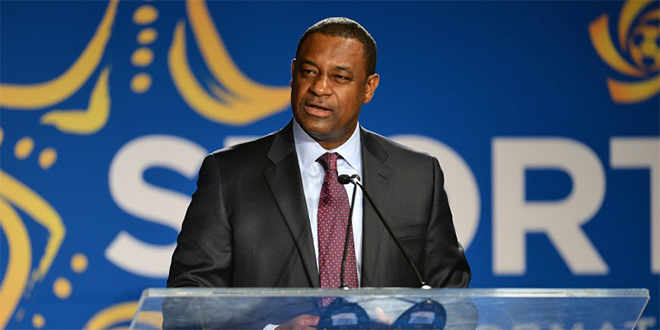By Andrew Warshaw
October 8 – FIFA vice-president Jeffrey Webb, world football’s most influential powerbroker in the global bid to stamp out racism, has issued another hard-hitting indictment of progress – or lack of it – and says a major challenge lies ahead to make sure the 2018 World Cup in Russia is void of discrimination.
Russian football continues to suffer at both club and national level from fan abuse and violence while opportunities for black coaches, even in supposedly developed footballing countries like England, are few and far between.
Chairman of FIFA’s anti-discrimination Task Force, Webb congratulated UEFA for its recent strong sanctions against CSKA Moscow and the head of Italian football federation, Carlo Tavecchio. But, he said, it was only a start.
“We are making steps gradually but we still have a huge fight on our hands,” Webb told delegates at the Leaders in Sport business summit.
Asked specifically to comment on the situation in Russia, Webb replied: “The challenge there is huge. But it must start and end with education, and it must start from the top down.”
When it comes to lack of opportunities for black coaches, addressed many years ago in the United States with the implementation of the so-called Rooney Rule, Webb said this should not be disguised as hidden racism.
“I don’t see how this can be called hidden. Of the 92 (professional) clubs in English football, only two coaches are coloured. How many are there at board level in the (English) FA, or at UEFA for that matter? It’s only hidden from a discussion and commercial standpoint.”
“Last time I was here, I met Eddie Newton who used to be assistant manager at Chelsea. He was doing well with the club but couldn’t even get an interview, let alone a job. That’s not hidden. It’s right in front of your face.”
The Rooney Rule, first employed in American Football, insists on a certain quota of minority candidates being interviewed for positions.
“It has been tremendous but in this era, should we really be having to mandate opportunities for qualified individuals?” asked Webb. “How do you achieve a cultural change? FIFA can’t regulate that. It has to start with the clubs and the ownership.”
Switching to the debate over World Cup places, Webb, president of CONCACAF, re-iterated his stance that the confederation deserved more than its current quota of three spots plus a playoff especially after Costa Rica’s rollercoaster run to the quarterfinals in Brazil.
He takes the view that places should be proportional to the number of a Confederation’s members.
“We should get four spots,” said Webb. “For me it’s about proportional representation. Of course UEFA deserve to have more spots than the others if you look back at history. They’ve earned that.”
“But at under-17 and under-20 World Cup level it is much more proportionate. Why can’t you have that same level of equality at senior World Cup level? We believe CONCACAF has earned a full fourth spot and that half a slot and a playoff should be done away with.”
African and Asian nations also want greater representation but Webb said there had to be a fairer carving up of slots. “There is no way we can continue to justify the present format we have. And proportional representation goes for the FIFA executive committee as well as World Cup spots.”
Webb repeated his view that CONCACAF should automatically be awarded the 2026 World Cup, having been hardest hit by the end of the rotation process, and also came down on the side of the Canadian organisers of next year’s women’s World Cup in the escalating row over the use of artificial turf that has drawn a legal protest from a raft of leading players complaining about gender discrimination.
“I actually believe that a very good artificial pitch is better than a bad grass one,” said Webb.
Contact the writer of this story at moc.l1745215201labto1745215201ofdlr1745215201owedi1745215201sni@w1745215201ahsra1745215201w.wer1745215201dna1745215201

